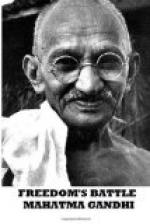We have a better method. Unlike that of violence it certainly involves the exercise of restraint and patience: but it requires also resoluteness of will. This method is to refuse to be party to the wrong. No tyrant has ever yet succeeded in his purpose without carrying the victim with him, it may be, as it often is, by force. Most people choose rather to yield to the will of the tyrant than to suffer for the consequences of resistance. Hence does terrorism form part of the stock-in-trade of the tyrant. But we have instances in history where terrorism has failed to impose the terrorist’s will upon his victim. India has the choice before her now. If then the acts of the Punjab Government be an insufferable wrong, if the report of Lord Hunter’s Committee and the two despatches be a greater wrong by reason of their grievous condonation of those acts, it is clear that we must refuse to submit to this official violence. Appeal the Parliament by all means, if necessary, but if the Parliament fails us and if we are worthy to call ourselves a nation, we must refuse to uphold the Government by withdrawing co-operation from it.
THE DUTY OF THE PUNJABEE
The Allahabad Leader deserves to be congratulated for publishing the correspondence on Mr. Bosworth Smith who was one of the Martial Law officers against whom the complaints about persistent and continuous ill-treatment were among the bitterest. It appears from the correspondence that Mr. Bosworth Smith has received promotion instead of dismissal. Sometime before Martial Law Mr. Smith appears to have been degraded. “He has since been restored,” says the Leader correspondent, “to his position of a Deputy Commissioner of the second grade from which he was degraded and also been invested with power under section 30 of the Criminal Procedure Code. Since his arrival, the poor Indian population of the town of Amhala Cantonment has been living under a regime of horror and tyranny.” The correspondent adds: “I use both these words deliberately for conveying precisely what they mean.” I cull a few passage from this illuminating letter




